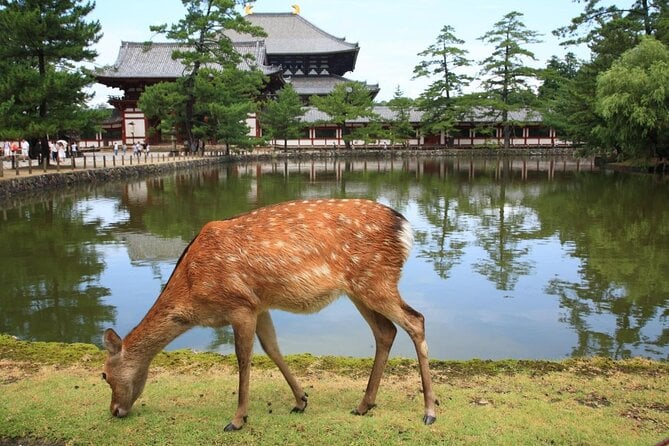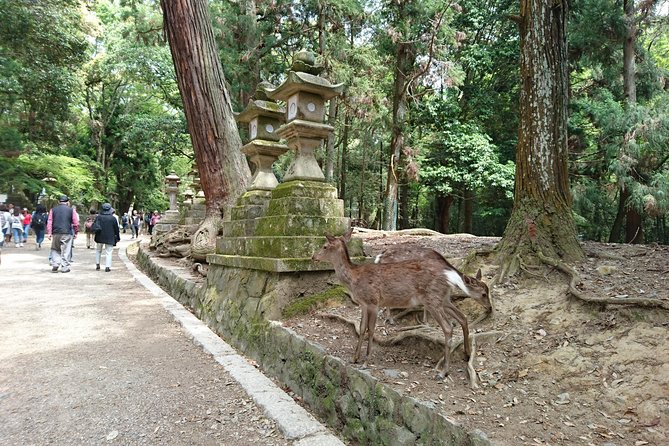Nara, a tranquil city in Japan’s Kansai region, offers a perfect escape for relaxation and culture.
The Deer Park is a must-visit, where friendly deer roam freely and have become icons of the city.
Todai-ji Temple, home to the world’s largest bronze Buddha statue, is a majestic Buddhist landmark.
And in the charming Merchants’ Town, traditional wooden buildings and quaint shops create a nostalgic atmosphere.
Nara’s beauty, history, and unique experiences make it an ideal destination for those seeking serenity and cultural exploration.
- Good To Know
- Nara’s Deer Park: A Tranquil Oasis
- Todai-ji Temple: A Majestic Buddhist Landmark
- Exploring Nara’s Merchants’ Town
- Discovering Nara’s Rich Cultural Heritage
- Unforgettable Encounters With Nara’s Friendly Deer
- The Magnificent Great Buddha of Todai-ji Temple
- Strolling Through Nara’s Charming Streets
- Indulging in Delicious Local Cuisine
- Common Questions
- What Is the Cancellation Policy for the Activity?
- Is There a Refund Policy in Case of Cancellation?
- What Happens if the Weather Is Not Good on the Day of the Activity?
- How Long Is the Duration of the Activity?
- Where Is the Meeting Point for the Activity?
- The Sum Up
- More Tour Reviews in Nara
- Looking for something different? Other Nara activities we've written about
Good To Know

- Nara’s Deer Park is home to freely roaming deer that have become iconic symbols of the city.
- Todai-ji Temple houses the world’s largest bronze Buddha statue and is a significant Buddhist landmark.
- Nara’s Merchants’ Town offers a vibrant hub of commerce and trade, showcasing traditional crafts and allowing visitors to purchase unique handmade goods.
- Nara’s rich cultural heritage is showcased through traditional crafts, interactions with artisans, and experiences such as tea ceremonies and calligraphy.
Nara’s Deer Park: A Tranquil Oasis

Nara’s Deer Park, a tranquil oasis, offers visitors the opportunity to relax and unwind amidst the serene beauty of nature. One of the highlights of the park is the chance to interact with Nara’s sacred deer, creating a unique wildlife experience that’s unlike any other. These gentle creatures roam freely throughout the park, and visitors can feed them special deer crackers, known as shika senbei, which are available for purchase.
This close encounter with the deer allows for a deeper connection with nature and a chance to appreciate the harmonious coexistence between humans and animals. As you stroll through the park, you’ll be surrounded by the magnificent sights of ancient temples and lush greenery, creating a peaceful ambiance that’s truly rejuvenating for the soul.
Nara’s Deer Park is a must-visit destination for anyone seeking a tranquil escape and an unforgettable wildlife encounter.
Find more activities and experiences we've covered in Nara.
Todai-ji Temple: A Majestic Buddhist Landmark
The Todai-ji Temple, a majestic Buddhist landmark, stands as a testament to the rich cultural heritage of Nara. This historical site holds immense significance, both historically and spiritually.
Built in the 8th century, Todai-ji Temple served as the head temple of all provincial Buddhist temples during the Nara period. The temple’s main hall, known as the Daibutsuden, is an architectural marvel and holds the distinction of being the largest wooden structure in the world. Inside this massive hall, visitors can marvel at the Great Buddha statue, which stands at a towering height of 15 meters.
The temple complex also houses many other important Buddhist artifacts and treasures. A visit to Todai-ji Temple is an opportunity to take in the deep historical and religious roots of Nara.
Exploring Nara’s Merchants’ Town
Exploring the merchants’ town in Nara reveals a vibrant and bustling hub of commerce and trade. Nara’s traditional crafts are showcased in the traditional markets, offering visitors a glimpse into the rich cultural heritage of the city. One can find a wide variety of handmade goods, including pottery, textiles, and lacquerware. These traditional crafts are passed down through generations and reflect the skilled craftsmanship of the local artisans.
Exploring Nara’s traditional markets allows visitors to not only purchase unique souvenirs but also to enjoy the local culture and history. The lively atmosphere and the interactions with the friendly merchants make the experience even more enjoyable. Whether it’s strolling through the narrow alleyways or browsing through the colorful stalls, Nara’s merchants’ town offers a delightful experience for all.
Discovering Nara’s Rich Cultural Heritage
Visitors can explore Nara’s rich cultural heritage by seeing its traditional crafts and vibrant markets.
Nara is known for its long history and deep cultural roots, making it a treasure trove for those interested in discovering its cultural treasures.
One way to do this is by exploring the local markets, where artisans showcase their skills and sell a wide range of traditional crafts, such as pottery, textiles, and lacquerware.
These markets not only offer a chance to purchase unique souvenirs but also provide an opportunity to interact with the artisans and learn about their craft.
Plus, visitors can enjoy local traditions by participating in traditional tea ceremonies or trying their hand at calligraphy.
Unforgettable Encounters With Nara’s Friendly Deer
Nara’s friendly deer offer unforgettable encounters for visitors. Interacting with wildlife is a unique experience, and the deer in Nara provide just that. These gentle creatures roam freely in Nara Park, where visitors can feed and pet them.
The cultural significance of deer in Nara dates back centuries, as they’re considered sacred messengers of the gods in Shinto mythology. They’re also seen as symbols of the city and are protected by law. The deer have become accustomed to human presence and are known for their friendly and approachable nature.
It’s a truly magical experience to be able to interact with these beautiful animals in such a serene and historic setting.
- Nara: Horyuji, Hokiji, Chuguji & Horinji Temple Entry Ticket
- Nara: Nara Park Private Family Bike Tour With Lunch
- Nara: Giant Buddha, Free Deer in the Park (Italian Guide)
- Nara Private Tour by Public Transportation From Kyoto
- Nara: Cooking Class, Learning How to Make Authentic Sushi
- Nara: Cultural Heritage Tour by Rickshaw
The Magnificent Great Buddha of Todai-ji Temple
The Magnificent Great Buddha of Todai-ji Temple stands as an awe-inspiring symbol of Buddhist devotion and architectural grandeur. This iconic statue is a must-see attraction in Nara, attracting visitors from all over the world.
The unique architecture at Todai-ji Temple adds to the allure of the Great Buddha, which is the largest bronze statue of its kind in the world.
The Cultural significance of the Great Buddha can’t be overstated. It represents the spread of Buddhism and the historical background of Todai-ji Temple, which was originally built in the 8th century.
The temple’s connection to Nara’s famous deer is also significant, as the deer are considered sacred messengers of the gods and are often seen roaming freely around the temple grounds.
Visitors can explore the surrounding area of Todai-ji Temple, which includes beautiful gardens and other historical structures. The temple has played a crucial role in promoting Buddhism and has had a profound influence on Nara’s cultural heritage.
Strolling Through Nara’s Charming Streets
While exploring Nara, visitors can leisurely wander through the charming streets, seeing the vibrant atmosphere of the city. Nara’s hidden gems can be found along these streets, offering a glimpse into the rich cultural heritage of the region.
One of the highlights is the abundance of traditional crafts in Nara. From delicate pottery and intricate lacquerware to beautiful textiles and exquisite metalwork, these crafts showcase the skill and craftsmanship of local artisans. Strolling through the streets, visitors can discover unique shops and boutiques that specialize in these traditional crafts. It’s a wonderful opportunity to not only purchase one-of-a-kind souvenirs but also learn about the history and techniques behind these ancient art forms.
Exploring Nara’s charming streets is a delightful way to experience the city’s past and present, all while uncovering its hidden treasures.
Indulging in Delicious Local Cuisine
Indulging in delicious local cuisine, visitors can savor the flavors of Nara’s culinary delights. Nara is renowned for its traditional food experiences, offering a unique blend of flavors and ingredients that reflect the region’s rich history and culture.
One must-try dish is ‘kakinoha-zushi,’ a type of sushi wrapped in persimmon leaves, which adds a subtle sweetness to the rice and fish. Another local favorite is ‘kaki no ha zushi,’ which is sushi wrapped in persimmon leaves.
Plus, Nara is famous for its ‘yuba,’ a delicate soybean skin that’s often served in hot pots or as a topping for rice. Other must-try dishes include ‘miyaki,’ grilled deer meat, and ‘narazuke,’ pickled vegetables that are a popular souvenir.
Whether it’s exploring the local markets or dining in traditional restaurants, Nara offers a stack of culinary delights that are sure to satisfy any food lover’s cravings.
Common Questions
What Is the Cancellation Policy for the Activity?
The cancellation policy for the activity includes a full refund if canceled up to 24 hours in advance. However, there is no refund if canceled less than 24 hours before the start time.
Is There a Refund Policy in Case of Cancellation?
Yes, there is a refund policy in case of cancellation. The cancellation policy states that a full refund will be given if canceled up to 24 hours in advance, but no refund will be provided if canceled less than 24 hours before the start time.
What Happens if the Weather Is Not Good on the Day of the Activity?
If the weather is not good on the day of the activity, alternative activities and indoor attractions may be offered as options. This ensures that travelers can still enjoy their time in Nara.
How Long Is the Duration of the Activity?
The duration of the activity is approximately 6 hours. It is recommended to visit during good weather. If the weather is poor, the activity can be canceled with an alternative date or a full refund.
Where Is the Meeting Point for the Activity?
The meeting point for the activity is back at the meeting point. If the activity is canceled up to 24 hours in advance, a full refund will be given.
The Sum Up
To sum it up, Nara is a tranquil city that offers a perfect blend of relaxation and culture.
From the serene Deer Park, where visitors can interact with friendly deer, to the majestic Todai-ji Temple, home to the largest bronze statue of Buddha, Nara is a haven for those seeking tranquility and spiritual enlightenment.
Exploring the charming Merchants’ Town and indulging in delicious local cuisine further enhance the experience.
Nara truly offers a serene escape from the hustle and bustle of everyday life.
More Tour Reviews in Nara
Looking for something different? Other Nara activities we've written about
- Essential Nara: Origins of Spiritual Japan
- Nara Gardens and Temples Private Guided Tour with Transport
- Full Day Guided Tour to Nara from Osaka by Van
- Nara: Dusk Walk with Calligraphy and Lanterns
- Nara: Muro-ji Temple Serenity, Tradition and Sacred Beauty
- Activity Sushi Experience Course in Nara
- Kyoto/Nara: Exclusive Private Guided Tour with Hotel Pickup
- NaraOnigiri Making Experience
- Nara: Jog Through 3 UNESCO World Heritage Sites with Deers
- Nara: Walking Tour with Kfuku-ji and Tdai-ji Temples
- Private tour of Nara with an English/Spanish-speaking Guide
- Nara: Private Walking Tour with a Local
